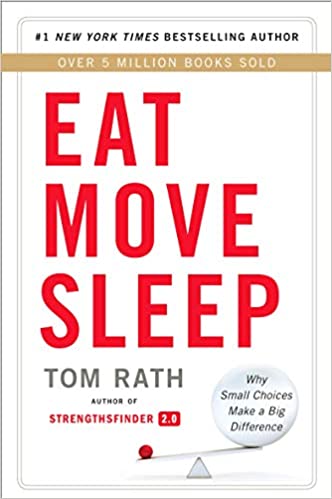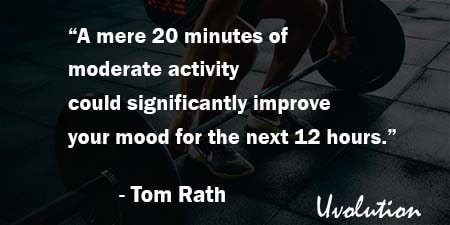Eat Move Sleep by Tom Rath Summary
The Book in 1 Sentences
Eat Move Sleep: How Small Choices Lead to Big Changes
“No single act can prevent cancer or guarantee that you will live a long life. Anyone who promises you that absolute is a fraud. What I will share in this book are some of the most practical ideas to improve your odds of a longer, healthier, and more fulfilling life.” ~ Tom Rath
5 BIG Ideas
1. Elite performers need 10,000 hours of ‘deliberate practice’ to reach levels of greatness + 8 hours and 36 minutes of sleep.
2. “Most people need seven hours of sleep just to be in the game the next day and ideally eight to have enough energy to win.”
3. Sugar is a toxin.
4. “Carbs are a ‘nutrient for which humans have no absolute requirement.’”
5. Your brain works better following exercise.
Eat Move Sleep Book Summary
Tom says: “Let me be clear. I am not a doctor. Nor am I an expert on nutrition, exercise physiology, or sleep disorders. I am just a patient. I also happen to be a researcher and voracious reader who loves to extract valuable findings and share them with friends.
In this book, you will find the most credible and practical ideas I have found so far.
What I learned from all this research influences my countless daily decisions. Every bite of food either increases or decreases my odds of spending a few more years with my wife and two young children.
Half an hour of exercise in the morning makes for better interactions all day. Then a sound night of sleep gives me energy to tackle the next day. I am a more active parent, a better spouse, and more engaged in my work when I eat, move, and sleep well.”
1. Work on All Three Simultaneously (Eat + Move + Sleep)
“Starting your day with a healthy breakfast increases your odds of being active in the hours that follow. This helps you eat well throughout your day. Consuming the right food and adding activity makes for a much better night’s sleep. This sound night of sleep will make it even easier to eat well and move more tomorrow.
In contrast, a lousy night of sleep immediately threatens the other two areas. That bad night of sleep makes you crave a less healthy breakfast and decreases your odds of being active.
In the worst-case scenario, all three elements start to work against you, creating a downward spiral that makes each day progressively worse. This is why the book is structured to help you work on all three elements together and not broken into three parts about eating, moving, and sleeping.
New research shows that tackling multiple elements at the same time increases your odds of success, compared to initiating a new diet or exercise program in isolation.
Eating, moving, and sleeping are even easier if you work on all three simultaneously. These three ingredients for a good day build on one another. When these elements are working together, they create an upward spiral and progressively better days.”
“If you eat, move, and sleep well today, you will have more energy tomorrow. You will treat your friends and family better. You will achieve more at work and give more to your community. It all starts with making decisions like *tomorrow* depends on it.”
2. 10,000 Hours & 8 Hours and 36 Minutes
“One of the most influential studies on human performance, conducted by professor K. Anders Ericsson, found that elite performers need 10,000 hours of ‘deliberate practice’ to reach levels of greatness.
While this finding sparked a debate about the role of natural talent versus countless hours of practice, another element was all but missed.
If you go back to Ericsson’s landmark 1993 study, there was another factor that significantly influenced peak performance: sleep. On average, the best performers slept 8 hours and 36 minutes. The average American, for comparison, gets just 6 hours and 51 minutes on weeknights.
The person you want to fly your airplane, operate on your body, teach your children, or lead your organization tomorrow is the one who sleeps soundly tonight.
Yet in many cases, people in these vital occupations are the ones who think they need the least sleep. And more than 30 percent of workers sleep less than six hours per night.”
“Most people need seven hours of sleep just to be in the game the next day and ideally eight to have enough energy to win.”
3. Sugar is a Toxin
“Sugar is a toxin. It fuels diabetes, obesity, heart disease, and cancer. At the current dose we consume, more than 150 pounds per person every year, sugar and its derivatives kill more people than cocaine, heroin, or any other controlled substance around.
One report aptly describes sugar as ‘candy for cancer cells.’ It accelerates aging and inflammation in the body and subsequently fuels tumor growth. It is now clear that if you lower your sugar intake, you reduce your odds of developing cancer.”
4. Measurement Creates Improvement
“One little secret of medicine and social science is how measurement itself creates improvement. When researchers study the effect of a given intervention, simply asking people to track a specific outcome makes it more likely to improve. While this is a limitation for scientific experiments, you can use this to your advantage.
If you want to increase your activity, measure how much you move. When people are assigned to wear a pedometer as part of randomized controlled trials, they walk at least one extra mile per day on average. Overall activity levels go up by 27 percent. Body Mass Index (BMI) decreases, and blood pressure goes down.”
5. The Grocery Store
“The most influential choices you make for your health occur in the grocery store. Once you put something in your cart, good or bad, it is likely to end up in your stomach. Even if you feel some remorse about your poor choice in the store, when you get home, your willpower stands little chance. After all, you paid for it, and it is only a few steps away at that point.
Anytime I visit our neighborhood grocery store, I spend most of my time in the fresh produce and seafood sections. I also try to avoid the middle aisles altogether. As they are filled with unhealthy, addictive items. If I don’t see the salty pretzels, there is no chance they will wind up in my cart.”
6. Refined Carbohydrates
“We are addicted to refined carbohydrates. One publication went as far as to describe carbs as ‘more addictive than cocaine’ and concluded, ‘At the center of the obesity universe lies carbohydrates, not fat.’
As a team of Harvard researchers wrote in the Journal of American Medical Association, carbs are a ‘nutrient for which humans have no absolute requirement.’ Another study suggests that eating fewer carbs even curbs cancer growth by as much as 50 percent. ...
Do everything you can to replace refined carbohydrates with vegetables when you prepare or order a meal. You get enough carbohydrates from fruits, vegetables, and protein.
Try to reduce your consumption of pasta, bread, rice, and chips in particular. Most restaurants will let you substitute a vegetable for a side of rice, pasta or fries.
Keep most of the refined carbs from making it to your plate in the first place. That way you won’t need a superhuman amount of willpower to resist what is sitting in front of you during a meal.”
“As one of the world’s leading researchers on obesity put it, the next time you consume buttered toast, consider that the butter may be healthier than the bread.”
7. A Vaccine for The Common Cold
“What if someone told you there was finally a vaccine for the common cold? One experiment suggests a good night’s sleep may be the answer.
Participants in this study reported their sleep quality for 14 consecutive nights. Then they were quarantined and given nasal drops containing a rhinovirus (common cold).
Researchers monitored participants for the next five days to see if they developed a cold. This experiment revealed that the participants who typically had less than seven hours of sleep before being exposed to the rhinovirus were nearly three times as likely to develop a cold.”
“Prioritize eight hours of sleep ahead of all else. ... Remember, every extra hour of sleep is a positive investment. It is not an expense.”
8. Your Brain Works Better Following Exercise
“Your brain works better following exercise. A team of researchers in Ireland made this discovery through a relatively simple experiment. They asked a group of students to watch a rapid lineup of photos. Each photo included a name and face of a stranger.
Then, after a brief break, the students tried to recall the names of the faces that had moved across the computer screen.
After this initial test, half of the students were asked to ride a stationary bicycle at a strenuous pace until they reached exhaustion. The other half of the students sat quietly for 30 minutes. Then both groups took the test again to see how many names they could recall.
The group of students who exercised performed much better on the memory test than they had on their first attempt. The group who simply sat in another room did not improve.
As part of this experiment, the scientists also collected blood samples, through which they discovered a biological explanation for the increase in recall among the students who exercised.
Immediately after the strenuous activity, students in the exercise group had much higher levels of a protein known as brain-derived neurotrophic factor, or BDNF, which promotes the health of nerve cells.”
That was my QUICK Eat Move Sleep book summary. If you’re interested, get your copy. There is a HUGE amount of wisdom and life-changing ideas in this book, and we’ve only touched on a tiny bit of it.
Buy The Book: Eat Move Sleep by Tom Rath

GET Blinkist 7 Days FREE Trial
3000+ Book Summaries
(Audio and Text)





